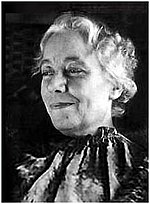Karen Horney
| Karen Horney | |
|---|---|

Karen Horney
|
|
| Born |
16 September 1885 Blankenese, Schleswig-Holstein, Prussia, German Empire (now Blankenese, Hamburg, Germany) |
| Died | 4 December 1952 (aged 67) New York City, New York, United States |
| Nationality | German |
| Fields | Psychoanalyst |
| Spouse | Oscar Horney |
| Children | 3 |
Karen Horney (/ˈhɔːrnaɪ/; born Danielsen, 16 September 1885 – 4 December 1952) was a German psychoanalyst who practiced in the United States during her later career. Her theories questioned some traditional Freudian views. This was particularly true of her theories of sexuality and of the instinct orientation of psychoanalysis. She is credited with founding feminist psychology in response to Freud's theory of penis envy. She disagreed with Freud about inherent differences in the psychology of men and women, and she traced such differences to society and culture rather than biology. As such, she is often classified as Neo-Freudian.
Karen Horney was born Karen Danielsen on 16 September 1885 in Blankenese, Germany, near Hamburg. Her father, Berndt Wackels Danielsen (1836–1910), was Norwegian but had German citizenship. He was a ship's captain in the merchant marine, and a Protestant traditionalist (his children nicknamed him "the Bible-thrower", as he did indeed throw Bibles).
Her mother, Clotilde, née van Ronzelen (1853–1911), known as "Sonni", was also Protestant, of Dutch origin. She was said to be more open-minded than Berndt, and yet she was "depressed, irritable, and domineering toward Karen".
Karen's elder brother was also named Berndt, and Karen cared for him deeply. She also had four elder half-siblings from her father's previous marriage. However, there was no contact between the children of her father’s two marriages.
According to Horney's adolescent diaries her father was "a cruel disciplinary figure," who also held his son Berndt in higher regard than Karen. Instead of being offended or feeling indignation over Karen's perceptions of him, her father brought her gifts from far-away countries. Despite this, Karen always felt deprived of her father's affection and instead became attached to her mother.
From roughly the age of nine Karen became ambitious and somewhat rebellious. She felt that she could not become pretty, and instead decided to vest her energies into her intellectual qualities — despite the fact she was seen by most as pretty. At this time she developed a crush on her older brother, who became embarrassed by her attentions — soon pushing her away. She suffered the first of several bouts of depression — an issue that would plague her for the rest of her life.
...
Wikipedia
